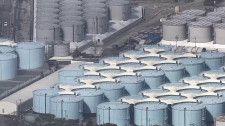Immorted nuclear power processing water marine release reputation damage ... Fishermen's anxiety
"Interview department spoiler" that collects reporters' push stories.
Reporter Fukushima Television and Akira Onoda will tell you about "the release of the water approached about a year later."
On March 11, 2022, 11 years after the Great East Japan Earthquake and the Fukushima Daiichi nuclear accident.
2022 is the year when the reconstruction of the evacuation order area accelerates.
Since the spring of 2022, part of the reconstruction base established in the difficult -to -return area, some residents live at home, etc., using the special system called "prepared accommodation" in the estimate of evacuation orders.We are preparing for the return.
In February, the Taiwanese authorities have canceled the import ban on foods in Fukushima and other foods, which have been continued after the nuclear accident, which was a nice news for farmers and fishermen in Fukushima Prefecture.
However, about a year later, the fishermen are worried.That is the marine release of the processing water of the Fukushima Daiichi Nuclear Power Plant.
The processing water, which has become a problem, is still increasing at the Fukushima Daiichi Nuclear Power Plant.
The cause is "fuel debris", a melted fuel remaining in the reactor.
Water for cooling this, rainwater and groundwater flowing into the reactor, etc., are increasing at a pace of 150 tons a day, including radioactive materials.
This contaminated water is a purification device called ALPS (Alps), which is processed to remove most radioactive materials, but "tritium", which has similar properties from water, cannot be removed by current technology.
For this reason, water containing tritium is stored in a tank installed in the nuclear power plant land as a processing water.
There are more than 1,000 tanks, and the capacity is 1.37 million tons, but the current storage is 95 %, the limit is approaching.
It is difficult to add more tanks, and the government has decided to release processing water in April 2021, based on the discussions of more than six years by the national expert meeting.
This tritium is originally found in nature and occurs every day at nuclear power plants and reprocessing facilities in Japan and overseas.
In addition, the radiation of the beta line released by the tritium is considerably weak and has a very small effect on the human body.
For this reason, domestic and overseas nuclear power plants were released to the ocean in large quantities after providing standards for water concentrations containing tritium, and were released at the Fukushima Daiichi nuclear power plant before the accident.

And this time, the marine release planned at the Fukushima Daiichi Nuclear Power Plant is to be released from the seabed tunnel, which has been diluted to 1/10 of the national standard, and is further reduced to 1 km offshore.
This 1 km offshore was selected for reasons that fishing was not performed on a daily basis.
Although some considerations have been considered for fishermen, there is a concern about reputational damage.
Fishers in the prefecture have been raising the opposition and anger, saying that a new reputation has occurred, and the seafood is not sold, and there is a risk of being beaten, as the release of the processing water.
Fukushima Prefectural Fisheries Federation, Chairman Tetsu Nozaki, "The release of the ocean is a catastrophic blow to the fishery in Fukushima Prefecture, and it completely deprives the efforts and desire to revive."
Soma Futaba Fisheries Cooperative, Kanji Tachiya, "Clearly, the reputation control is proceeding at the same time, and if we don't have it to be named, we cannot shake our heads vertically."
Behind these anger is that in 2015, the Fisheries Federation, the country, and TEPCO in Fukushima Prefecture exchanged, "We will not dispose of the processing water without any understanding of the people involved."
However, in 2021, while the fishermen opposed, the marine release of processed water was decided.
At that time, Prime Minister Kan emphasized that "on the premise that the government will thoroughly prevent reputation, it has decided that the ocean release is realistic and compiled the basic policy."
Regarding the key reputation, the government plans a symposium to large consumption areas, such as Tokyo, to deepen their understanding of processing water, and the first was held in Tokyo in the fall of 2021.
Participants said, "I know I'm doing the test.
However, only less than 10 participants gathered at the venue due to the new colon virus.
The organizer explains that "700 people watched online", but it is uneasy to feel that the understanding of processed water and Fukushima prefecture products will be expanded.
The marine release is planned to start in the spring of 2023.
TEPCO is planning the construction of the necessary equipment at each stage of the "measurement, dilution, and release" of "measurement, dilution, and release", and is accelerating.
Don't let the fishermen in Fukushima feel hard again.
Country reputation measures are promoted in a visible way, and consumers have expanded, and TEPCO has no trouble or concealment, and preparations and work are proceeded.
Indeed, each effort of the past year has been questioned.
Ayako Kato Caster "I think it's important to show data firmly, but I don't think the feeling is so easy. So, in the true sense, to eliminate reputational damage.What do you need to do? "
Journalist Hideo Yanagisawa, "When the government decides the marine release itself, I guess the setup has been set up with this conclusion.In response to what the government or TEPCO is trying to do, there is a large quest mark in the part of "whether it is really reliable".I think that TEPCO and the government need to face the locals while showing objective data such as evaluation. First of all, we will regain the trust of local people and the country.If you can't, I feel like this reputational damage will not be open to solve it. "
